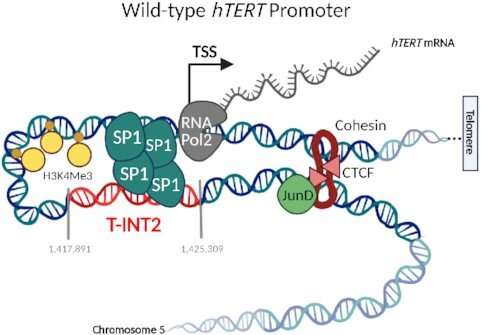
Scientists from A*STAR’s Institute of Molecular and Cell Biology (IMCB) and Genome Institute of Singapore (GIS), as well as the NUS Cancer Science Institute of Singapore (CSI Singapore), National Cancer Center Singapore (NCCS) and Nanyang Technological University (NTU), have identified an important cancer progression mechanism that is observed in 90% of cancer cells. This discovery will guide further development of cancer specific drugs with potentially fewer side effects. The research, led by IMCB, was published in the journal Nucleic Acids Research on 14 June 2022.
The life span of a normal healthy cell is determined by telomeres, protective caps at the ends of chromosomes. Each time a cell divides, the telomeres become shorter until eventually, they are too short to protect the DNA and the cell dies naturally. In contrast, cancer cells live through reactivating telomerase, an enzyme which can prolong telomeres, but is inactive in most adult cells.
By activating the Human Telomerase Reverse Transcriptase (hTERT) gene, cancer cells can continue to divide and multiply indefinitely in the body.
Studies have shown that telomerase is reactivated in as much as 90% of cancers, making hTERT, through which telomerase is activated, an excellent candidate for targeting cancer cells.
Current efforts to treat cancer by inhibiting telomerase with drugs have proven to be too toxic to patients due to the strong side effects on healthy cells. The research team has identified a specific DNA structure that forms only in cancer cells and brings the necessary molecular machinery into the correct position to activate the hTERT gene. The detailed mechanism of hTERT activation provided in this study would be instrumental in designing drugs to inhibit hTERT specifically in cancer cells with fewer side effects.
“Activation of telomerase is the most common oncogenic event providing immortality to cancer cells. We now know how to inhibit telomerase activity to target cancer cells specifically. This study will be a guide for developing next-generation cancer inhibitors,” said Semih Akincilar, Senior Research Fellow at A*STAR’s IMCB and lead researcher of the study.
Patient-derived colorectal cancer cell lines generated by GIS were utilized to identify correlative gene expression for hTERT activation and ascertain the physiological relevance of the findings in this study. These models will serve as a testbed for future studies aimed at the development of cancer-specific inhibitors of telomerase.
Source: Read Full Article
